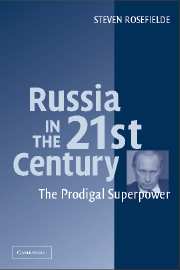Book contents
- Frontmatter
- Contents
- List of Figures and Tables
- List of Acronyms
- Preface
- Acknowledgments
- RUSSIA IN THE 21ST CENTURY
- Introduction
- 1 After “The End of History”
- 2 Prodigal Superpower
- 3 Structural Militarization
- 4 What Could Have Been Done?
- 5 Muscovite Metamorphosis
- 6 Military-Industrial Reform
- 7 National Vulnerabilities
- 8 The Miasma of Global Engagement
- 9 Putin's Choice
- 10 Candor
- Conclusion
- Glossary
- Notes
- Selected Bibliography
- Index
6 - Military-Industrial Reform
Published online by Cambridge University Press: 18 December 2009
- Frontmatter
- Contents
- List of Figures and Tables
- List of Acronyms
- Preface
- Acknowledgments
- RUSSIA IN THE 21ST CENTURY
- Introduction
- 1 After “The End of History”
- 2 Prodigal Superpower
- 3 Structural Militarization
- 4 What Could Have Been Done?
- 5 Muscovite Metamorphosis
- 6 Military-Industrial Reform
- 7 National Vulnerabilities
- 8 The Miasma of Global Engagement
- 9 Putin's Choice
- 10 Candor
- Conclusion
- Glossary
- Notes
- Selected Bibliography
- Index
Summary
The contours of Russia's emerging Muscovite economic system are coming increasingly into focus, but the details remain unsettled. Whether the Kremlin tilts toward liberal or conservative authoritarianism will depend importantly on Putin's handling of military-industrial reform. A decision to build full-spectrum, fifth-generation armed forces at Soviet procurement levels without competitively transforming Russia's economic base would surely mean a return to the conservative past. It would entail a restructuring of the oligarchy, with those in a position to gain from rearmament benefiting most. Alternatively, downscaling production capacities to current levels of arms delivery would strengthen the resource tycoons, while a full transition to consumer sovereign free enterprise would expand possibilities, permitting more efficient conservative and liberal variants.
The last option would be superior from the standpoints of Paretian economic efficiency and international security, but for the moment it appears only a remote possibility because the leadership is wedded to full-spectrum Soviet-type armed forces, despite Putin's call for a professional military by 2010, and is gradually subordinating Yeltsin's oligarchic priorities to its great latent superpower concerns. The rationale for full-spectrum armed forces is geostrategic. Russsia is a Eurasian continental power with blue water naval capabilities in the Baltic Sea and Pacific Ocean. It relies on space-assisted nuclear strategic deterrence and an extensive conventional border defense. Although large anti-NATO dedicated forces are no longer essential either to the west or southwest – indeed, Russia is even contemplating joining the European Union – its Eurasian borders warrant attention.
- Type
- Chapter
- Information
- Russia in the 21st CenturyThe Prodigal Superpower, pp. 86 - 100Publisher: Cambridge University PressPrint publication year: 2004



